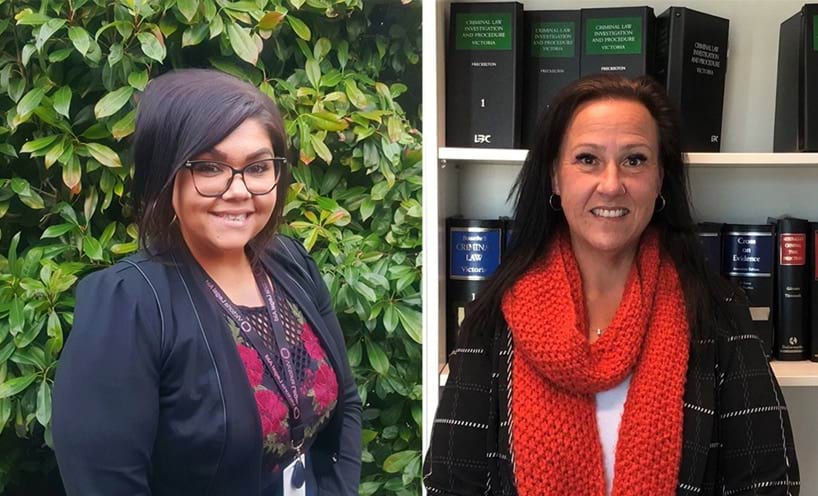- Published:
- Tuesday 25 May 2021 at 10:00 am
Ballarat Aboriginal Community Engagement Officer Ashlee Rodgers and Geelong Aboriginal Community Engagement Officer Belinda Foley
We have deepened our connection with Aboriginal and Torres Strait Islander communities with the appointment of two new Aboriginal community engagement (ACE) officers in our regional offices.
Aboriginal community engagement officers, Belinda Foley and Ashlee Rodgers have joined our Geelong and Ballarat offices respectively.
The ACE officer is a non-legal role that provides a connection between First Nations peoples and our services, and offers a helping hand that closes the gap between lawyer and client.
The role is a recognition of the disproportionately harmful impact of the legal system on Aboriginal and Torres Strait Islander peoples, and serves to improve access to justice by supporting clients to access services and support agencies. This is a key focus of our Reconciliation Action Plan(opens in a new window) and reflects our commitment to building a safe workplace for First Nations staff and to provide a culturally safe and responsive service to our clients.
Our Ballarat ACE officer position has been funded from our Specialist Family Violence Courts project, recognising the importance of developing and delivering culturally appropriate services for Aboriginal and Torres Strait Islander peoples experiencing family violence.
Utilising past connections to assist future clients
Belinda is enjoying the role and working with Indigenous communities.
‘As a proud Central Arrerntre woman, and having previously worked as an Aboriginal Community Engagement Officer for the Geelong Magistrates’ Court, I’m well aware of the importance of cultural and informed support for First Nations clients, and the lawyers who are representing them.
‘I love being a voice for those who haven’t been heard, ensuring my clients are culturally safe and supported, and educating our lawyers so they can gain improved cultural understanding, and deliver better outcomes for our Indigenous clients.’
Ashlee feels similarly passionate about advocating for Ballarat First Nations peoples.
‘I am a proud Yorta Yorta woman and enjoy every aspect of working with mob in Ballarat.
‘I have been here for more than a decade and have made many connections through my previous roles including Koori Liaison Officer at Federation University Australia, state-wide co-chair of the Marrung Regional Partnership Forum and co-chair of the Local Aboriginal Education Consultative Group.
‘Mob love to yarn, so I’m finding my local established relationships with stakeholders, services and organisations are definitely assisting me in my new role.’
Benefits of our ACE Officer program
The value of our ACE Officer program is not lost on Ashlee as she sees its benefit every day.
‘My work has an overwhelmingly positive impact on our clients as they have a legal aid person in their corner who is also First Nations.
‘They know I appreciate where they are coming from, understand the challenges and complexities they face on a daily basis and will always be available for support and guidance as they navigate the legal landscape.
‘I also hope to give my clients the confidence and knowledge to know what to do or where to go should they need legal help in the future,’ said Ashlee.’
Acknowledging the significance of Reconciliation Week and Sorry Day
As we celebrate Reconciliation Week and mark Sorry Day, Belinda and Ashlee see both events as important and cathartic for First Nations peoples and non-Indigenous persons alike.
‘Reconciliation Week is an opportunity for Australia to look at our First Nations mobs and learn about our cultures, celebrate our achievements and look at ways to strengthen the relationship between Aboriginal and non-Aboriginal peoples.
‘Sorry Day is long awaited acknowledgement of past wrongs and the trauma inflicted upon the Stolen Generation as well as a reminder that there is still much more work to do as Aboriginal and Torres Strait Islander children are still 10.6 times more likely than non-Indigenous children to be removed from their families(opens in a new window),’ said Ashlee.
For Belinda, Reconciliation Week and Sorry Day are bittersweet events.
‘I see Reconciliation Week as ‘being one with all’, celebrating and accepting all facets of our great cultures and learning more about my colleagues and their backgrounds, while sharing my Indigenous culture with them.
‘Conversely, Sorry Day is very personal to me and something I hold close to my heart.
‘My mum is Stolen Generation and was in Canberra when Prime Minister Kevin Rudd said sorry to the nation. It was heartfelt, accepted and heard.
‘That feeling is still shared strongly today and will continue to allow black and white Australia to move forward.
‘The past will never be forgotten, but the future is allowing the past to be acknowledged,’ said Belinda.
More information
Learn more about our Aboriginal community engagement officers(opens in a new window)
Learn about our commitment to becoming a client-centred organisation for First Nations peoples via our Aboriginal Services Strategy(opens in a new window)
Read more about our Reconciliation Action Plan(opens in a new window)
Updated


